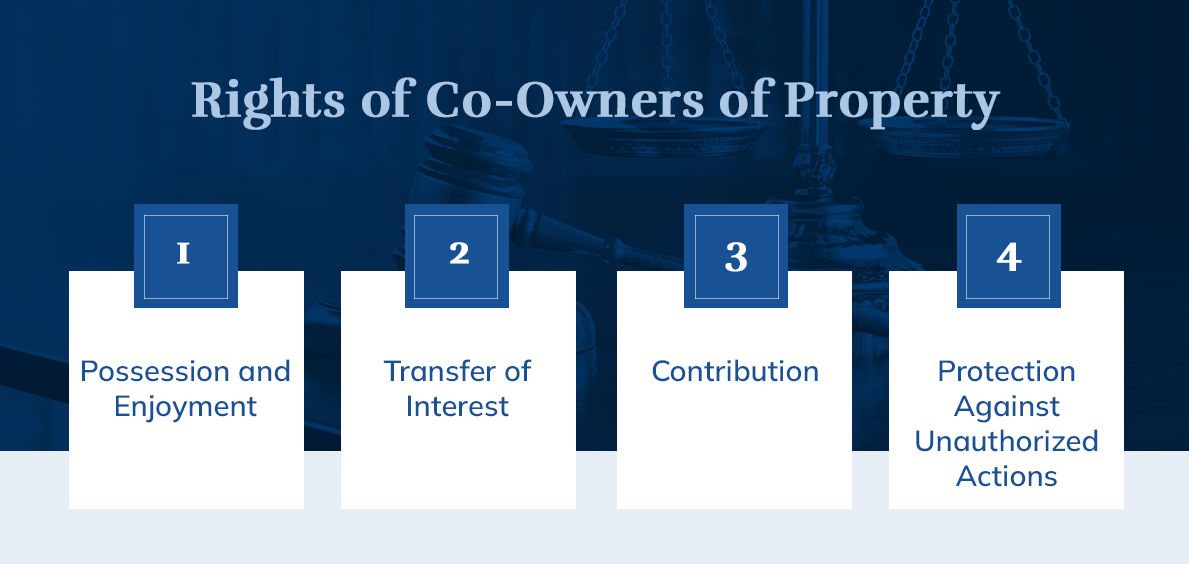
Owning property with others can be a rewarding experience, but it can also present unique challenges. Understanding your rights as a co-owner and the principles governing the separation of jointly owned assets can help protect your interests. This guide addresses these concerns.
Buzgon Davis Law Offices provides comprehensive legal guidance and support to individuals facing co-ownership issues.
Co-ownership occurs when two or more persons hold title to the same property. Persons in this context could be individuals or legal entities, such as companies. The property could also be real or personal, but co-owned assets are often real properties. Co-ownership of property can arise in many ways, including the following:
Considering the range of legal implications associated with co-owning a property, it’s best to consult an attorney before deciding to co-own property.
Co-ownership is a legal concept and arrangement where several persons own property simultaneously with rights and interests. When it comes to real property, there are three types of co-ownership:
Conversely, part ownership refers to a situation where one party owns a specific portion or percentage of a property. This ownership does not necessarily entail the same rights and responsibilities associated with co-ownership. For example, an individual can purchase a part-ownership interest in a vacation property, allowing them to use it for a specific time each year.

The rights of co-owners can vary based on the type of co-ownership. The specific terms outlined in the deed or agreement also play an essential role. Here is an overview of these rights:
Co-owners generally have the right to possess and use the entire property, regardless of their ownership share. Each co-owner may occupy the property and enjoy its benefits without restriction as long as their use does not interfere with the rights of others and is consistent with the intended purpose, whether residential, commercial or recreational.
Generally, co-owners can transfer or sell their ownership interest in the property to another party. However, the specifics can differ based on the type of co-ownership:
Co-owners may seek contributions from other co-owners for property-related expenses. These expenses may include mortgage payments, property taxes, insurance and maintenance. If one co-owner pays more than their share, they may recover the excess from the other co-owners.
Co-owners may protect themselves against unauthorized actions taken by the other co-owners that could adversely affect their interests. For example, one co-owner may not unilaterally mortgage, sell or encumber the property without the consent of the other co-owners unless that action is specifically allowed.
Generally, one co-owner cannot sell the entire property without the consent of the others. However, in a tenancy in common, a party may sell their interest without seeking consent from the others. The situation is similar for joint tenancies. However, transferring joint tenant interest disrupts the nature of the co-ownership, changing it to a tenancy in common. Regarding a tenancy by the entirety, both parties must usually agree before a party can even sell their interest in the property.
Parties may voluntarily separate jointly owned assets when all the co-owners agree on how to separate their interest. For example, they may decide to divide the property physically, if feasible, or sell it and share the proceeds. Where the co-owners disagree with the separation or how to divide the property, they can file a partition action in court.
A partition action is a legal process that allows co-owners to sell an asset and distribute the proceeds among themselves. It often terminates the co-ownership relationship and can occur in two ways. First, the court may allow the remaining owners to buy out the exiting owner’s share at its fair market value. Alternatively, the court may force the property to be placed for sale at its fair market value. The net proceeds will then be divided fairly between the former owners upon sale.
The court typically requires a professional appraisal to determine the fair market value of the property or share being sold. At the conclusion of a partition action, adjustments are made to determine how much each owner should receive.
Generally, the courts make adjustments for the period after which the joint use of the property ends. From that point forward, the owner who remains in possession and has paid the ongoing expenses will likely receive credit for expenses paid in excess of their proportionate share. This credit increases their share, generally by one-half of the costs incurred, while decreasing the exiting owner’s share.
By law, married couples cannot use a partition action because Pennsylvania divorce laws establish the procedures for liquidating real estate in divorce settings. Lastly, real estate co-ownership can involve any number of individuals. Therefore, you can use partition action to liquidate any interest in real estate, regardless of size.
Buzgon Davis Law Offices helps co-owners protect their rights. We understand the complexities surrounding these arrangements and can assist you in making informed decisions. Our experienced attorneys are dedicated to providing personalized legal guidance.
We prioritize open communication and ensure that clients are abreast of the progress of their cases. Our team will work diligently to explore amicable solutions, such as mediation and negotiation. If litigation becomes necessary to safeguard your interests, our skilled attorneys will represent and advocate on your behalf.
With a proven record of success and a commitment to client satisfaction, Buzgon Davls Law Offices can guide you and help you achieve a practical outcome. Your peace of mind is our top priority. We have close ties with the community and aim to establish long-standing relationships through effective legal services and other social initiatives.
Are you facing challenges with property co-ownership, looking to separate jointly owned assets or want to learn more? Buzgon Davis Law Offices is here to help. Our attorneys can examine your situation and provide tailored support.
Contact us today to schedule a consultation. We can discuss your legal challenges and help you find a practical solution!